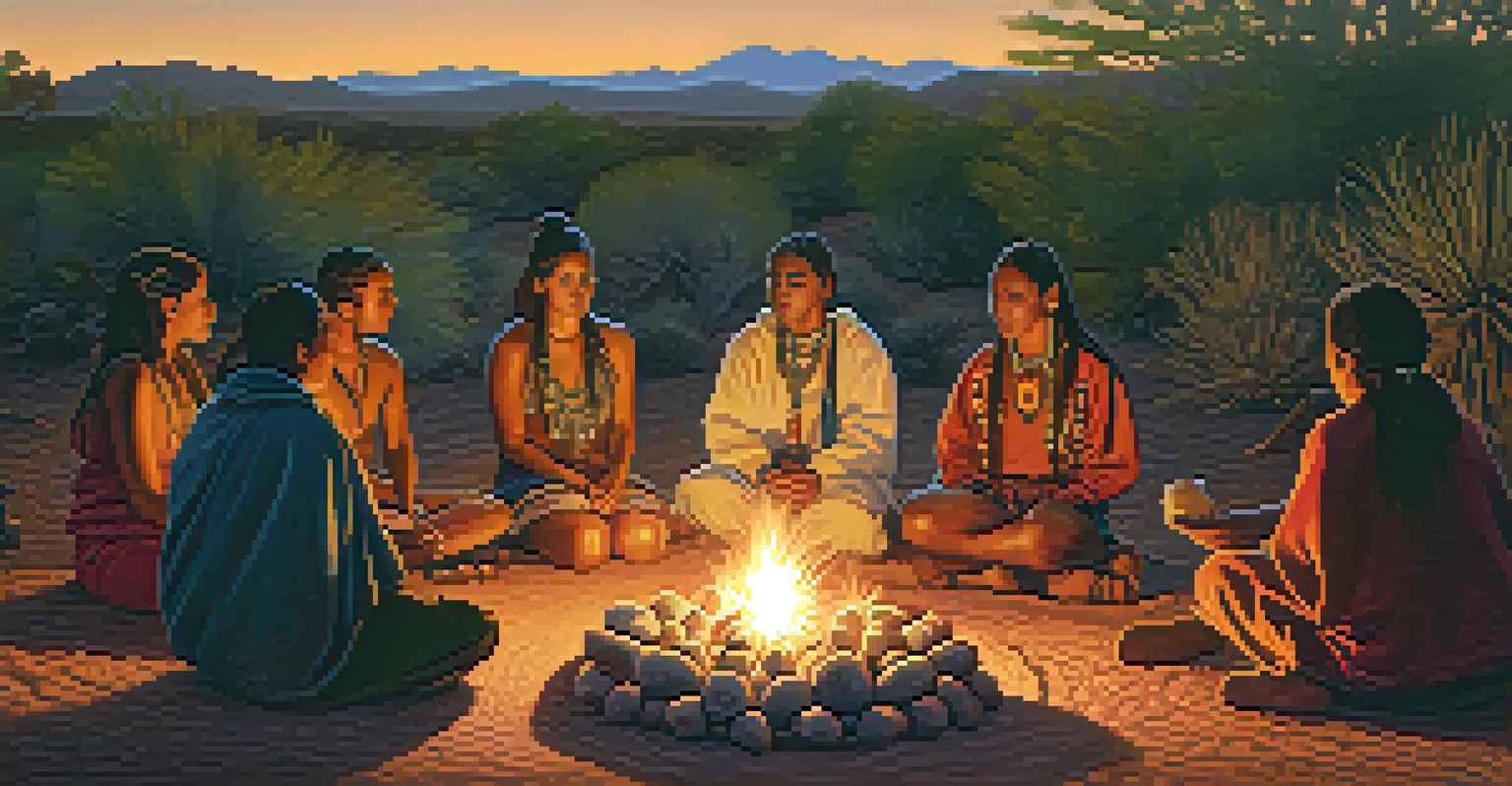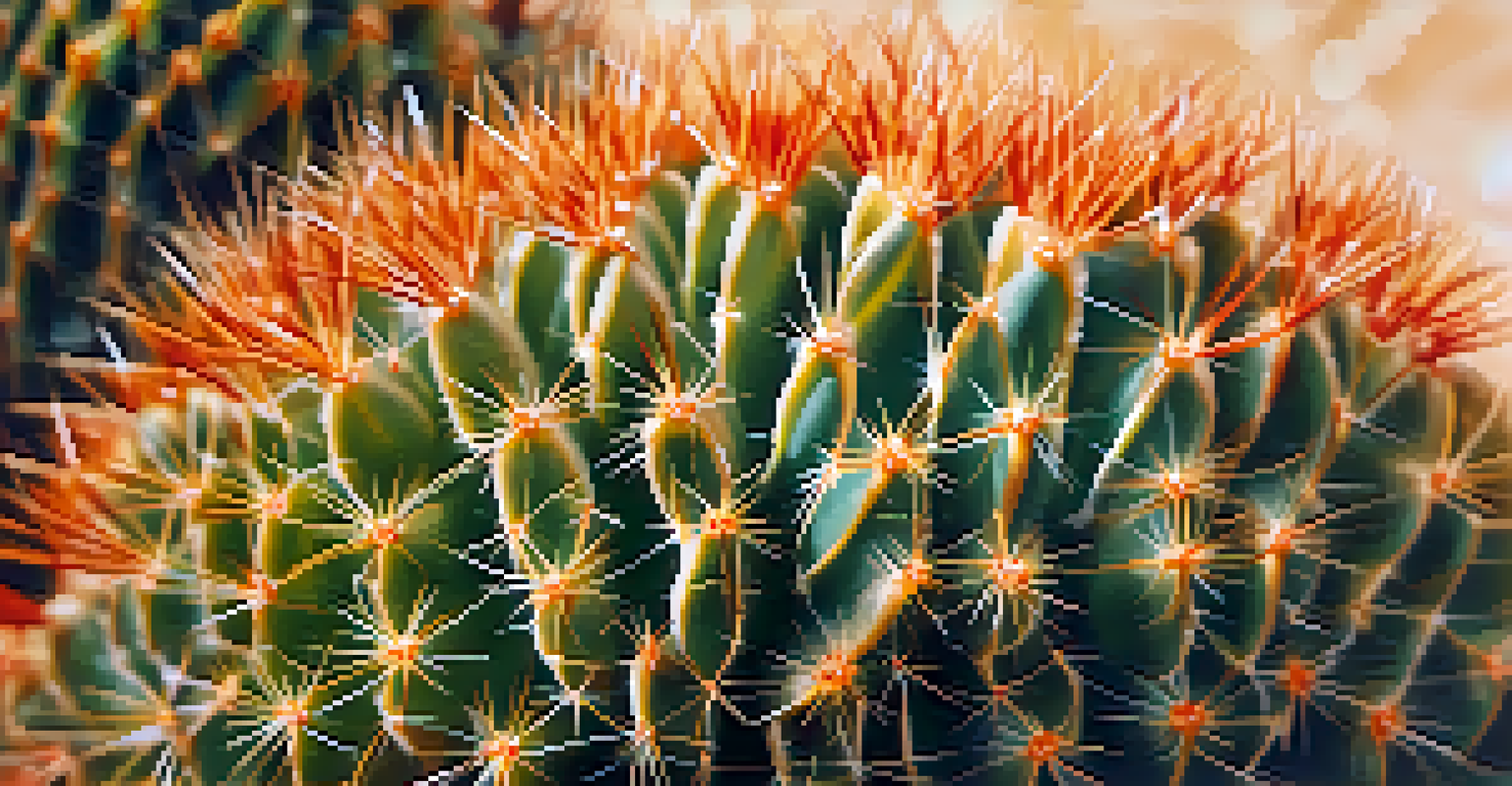Peyote Rituals: Indigenous Practices and Ethical Implications

Understanding Peyote: A Sacred Plant in Indigenous Cultures
Peyote, a small cactus native to Mexico and the southwestern United States, holds immense spiritual significance for many Indigenous peoples. Traditionally used in various rituals, its psychoactive properties are believed to facilitate deep spiritual connections and healing. For these communities, peyote is more than just a plant; it represents a vital link to their ancestors and cultural heritage.
Peyote is a bridge between the physical and spiritual worlds, allowing us to connect with our ancestors and our true selves.
The use of peyote is deeply embedded in the religious practices of tribes such as the Huichol and the Native American Church. During ceremonies, participants consume the cactus to enter altered states of consciousness, allowing them to engage with the spiritual world. These rituals are often communal, emphasizing unity and shared experience among participants.
Understanding the cultural context of peyote use is crucial, as it highlights the importance of respecting Indigenous traditions. With this knowledge, we can appreciate how peyote rituals serve not only as a form of spiritual exploration but also as a means of preserving cultural identity.
The Historical Context of Peyote Use Among Indigenous Peoples
The history of peyote use among Indigenous peoples stretches back thousands of years. Archaeological evidence suggests that its consumption dates to at least 5,000 years ago, with various tribes integrating it into their spiritual practices. This long-standing tradition showcases the plant's deep-rooted significance within these cultures.

European colonization brought significant disruption to Indigenous practices and beliefs, including the use of peyote. Despite attempts to suppress these rituals, many communities fought to maintain their traditions, leading to the establishment of the Native American Church in the early 20th century. This organization provided a legal framework for the use of peyote in religious ceremonies, helping to preserve these practices.
Cultural Significance of Peyote
Peyote serves as a vital link to cultural identity and spiritual practices among Indigenous peoples.
Today, the historical context of peyote use serves as a reminder of the resilience of Indigenous cultures. By understanding their struggles and triumphs, we can better appreciate the importance of peyote rituals in their ongoing efforts to preserve identity and spirituality.
Peyote Rituals: Structure and Significance in Ceremony
Peyote rituals are often structured events that involve specific practices, prayers, and songs. The ceremonies can last for several hours or even days, during which participants engage in various activities designed to promote introspection and connection to the spiritual realm. This structured approach allows individuals to fully immerse themselves in the experience.
Cultural appropriation is a form of theft that dismisses the significance of the cultures being borrowed from, especially when it comes to sacred traditions like peyote rituals.
One common element of peyote ceremonies is the presence of a leader, often referred to as a 'roadman' or 'medicine person.' This individual guides participants through the ritual, providing support and ensuring that the ceremony remains respectful and meaningful. Their role is crucial, as they help navigate the spiritual journey that peyote facilitates.
The significance of these rituals extends beyond the individual experience; they serve to strengthen community bonds and cultural identity. By participating together, members of the community reaffirm their shared beliefs and values, fostering a sense of belonging and unity.
Ethical Concerns: Appropriation and Misuse of Peyote
As interest in peyote rituals has grown beyond Indigenous communities, ethical concerns regarding appropriation and misuse have emerged. Many non-Indigenous individuals seek out peyote experiences without understanding the cultural significance, leading to potential exploitation of these sacred practices. This raises questions about respect and responsibility when engaging with Indigenous traditions.
Cultural appropriation occurs when elements of one culture are used by another without permission or understanding, often resulting in misrepresentation. In the context of peyote, this can manifest in commercialized experiences that strip away the spiritual essence of the rituals. Such actions can be deeply hurtful to Indigenous communities who see these practices as sacred.
Ethical Engagement with Traditions
Respect for Indigenous traditions is essential to prevent appropriation and ensure responsible engagement with peyote rituals.
To address these concerns, it's essential to approach peyote rituals with cultural sensitivity. This includes educating oneself about the traditions, seeking permission, and supporting Indigenous-led initiatives. By doing so, we can honor the cultural significance of peyote while also fostering respectful engagement.
Legal Status of Peyote: Challenges and Advocacy
The legal status of peyote varies widely, with certain protections for its use in religious ceremonies among Indigenous peoples. In the United States, the American Indian Religious Freedom Act allows for the use of peyote in recognized spiritual practices. However, outside of these contexts, its use can lead to legal repercussions, creating challenges for those who wish to engage in these rituals.
In recent years, advocacy efforts have emerged to protect Indigenous rights to peyote use and cultivation. These initiatives aim to raise awareness about the cultural significance of peyote and the need for legal protections. Such advocacy is crucial in ensuring that Indigenous practices are respected and preserved for future generations.
Navigating the legal landscape surrounding peyote use requires a nuanced understanding of both Indigenous rights and broader drug policies. As discussions around drug legalization evolve, it's important to consider how these changes may impact Indigenous communities and their sacred practices.
Potential Health Benefits: Spiritual and Psychological Aspects
Research into the health benefits of peyote has gained traction, particularly regarding its potential for therapeutic use. Some studies suggest that the psychoactive compound mescaline may facilitate emotional healing and personal growth. For many Indigenous practitioners, the spiritual and psychological benefits of peyote are intertwined, as the plant is viewed as a tool for self-discovery and healing.
Participants in peyote rituals often report profound insights and transformative experiences. These moments can lead to increased self-awareness, emotional release, and a deeper understanding of one's place in the universe. Such experiences highlight the potential of peyote as a means of personal and communal healing.
Legal Challenges for Peyote Use
The legal status of peyote varies, presenting challenges and advocacy needs for Indigenous rights to its use in spiritual practices.
While more research is needed to fully understand the health benefits of peyote, its role in Indigenous rituals underscores the importance of holistic approaches to wellness. By integrating spiritual and psychological aspects, peyote rituals offer a unique perspective on healing that extends beyond conventional methods.
The Future of Peyote Rituals: Preservation and Adaptation
As societal interest in peyote grows, the future of its rituals faces both challenges and opportunities. Indigenous communities are tasked with the delicate balance of preserving their traditions while also adapting to changing cultural landscapes. This evolution can lead to innovative ways of practicing rituals, ensuring their relevance in contemporary society.
Engagement with broader audiences can provide a platform for Indigenous voices, allowing for the sharing of knowledge and experiences surrounding peyote. However, this must be done thoughtfully, with an emphasis on respecting cultural boundaries and honoring the sacredness of the rituals. Collaboration between Indigenous leaders and non-Indigenous allies can help foster understanding and respect.

Ultimately, the future of peyote rituals lies in the hands of Indigenous communities. By prioritizing their autonomy and preserving their practices, they can ensure that peyote remains a vital part of their cultural heritage, continuing to offer spiritual guidance and connection for generations to come.